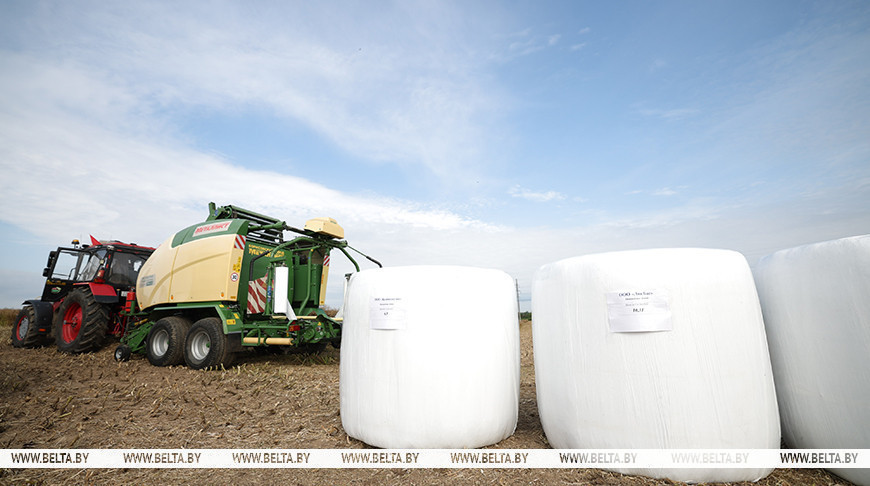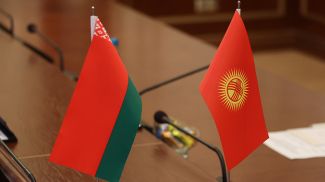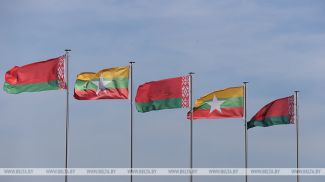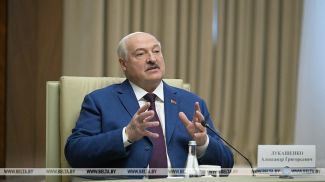
SMOLEVICHI DISTRICT, 8 August (BelTA) – During his visit to Ozeritsky-Agro in Smolevichi District, Belarusian President Aleksandr Lukashenko emphasized the need to produce various agricultural machinery, BelTA learned.
It has been noted that yields vary across regions and farms. Ozeritsky-Agro serves as a showcase example for others, with yields reaching an impressive 52 centners per hectare. “It is truly a pleasure to see these fields – everything is meticulously cultivated, simply beautiful! They have even made a pond,” the head of state remarked approvingly. “If all our fields were maintained to this standard, we could achieve yields of at least 45 centners per hectare, even if not hitting the 50 [centners per hectare] mark.”
It has been noted that yields vary across regions and farms. Ozeritsky-Agro serves as a showcase example for others, with yields reaching an impressive 52 centners per hectare. “It is truly a pleasure to see these fields – everything is meticulously cultivated, simply beautiful! They have even made a pond,” the head of state remarked approvingly. “If all our fields were maintained to this standard, we could achieve yields of at least 45 centners per hectare, even if not hitting the 50 [centners per hectare] mark.”
The outstanding results stem from a combination of crucial factors: the use of hybrid varieties (both imported and domestic, though the local varieties still need quality improvements), adherence to proper cultivation and harvesting techniques, timely and adequate fertilizer application and the employment of high-quality harvesting equipment.
The discussion then turned to the specific issue of harvesting equipment, with the president inquiring about the current localization rate in domestic baler production. It was reported that while approximately 35-40% of components are now locally sourced, the key mechanisms still rely on foreign manufacturing.
Aleksandr Lukashenko
recalled assigning these tasks when appointing Viktor Karankevich as Deputy
Prime Minister overseeing the industrial sector. Specifically, the president
highlighted the importance of manufacturing automatic balers and robotic
milking systems that should exceed international standards.
“We must
manufacture our own,” the head of state emphasized. He noted that a similar
situation existed years ago in Belarus' machinery manufacturing sector, when
localization rates were low and most components had to be imported, until the
president issued a firm directive to pursue import substitution and develop
domestic production. As a result, Belarus now manufactures its own vehicles.
“The same applies here. Five to ten years ago you were importing components,
but now we are seeing localization and replacement of foreign parts with
Belarusian-made ones. Get it done!” Aleksandr Lukashenko emphasized.
The use of
balers helps optimize harvesting and forage preparation processes. Belarus’
climatic conditions make it particularly challenging to produce and preserve
high-quality hay for livestock feed, as excessive moisture levels frequently
compromise the end product. While this forage harvesting method shouldn't be
abandoned completely, a viable alternative is plastic-wrapped conservation. “This
is exactly why we need our own baler – it's essential. We have already secured
a combine harvester that appears competitive with foreign models,” the president
remarked, stressing that similar efforts should focus on developing a domestic
baler.
The same
approach applies to manufacturing milking robots. Advancing mechanization in
agriculture and other sectors remains imperative – not only to boost efficiency
but also to maintain quality standards amid shrinking labor resources.
The discussion on import substitution touched upon another critical aspect – the production of plastic film used in baler-based forage harvesting and subsequent preservation. This material accounts for a significant portion of total costs (up to 60%), making this preservation method considerably more expensive than traditional trench silage techniques. However, plastic-wrapped bales offer substantially better forage preservation and quality, which translates into higher dairy cow productivity and improved livestock health. “When considering the big picture, this [plastic-wrap method] is undoubtedly beneficial,” Aleksandr Lukashenko concluded.
For instance, farms in Minsk Oblast currently use film from five manufacturers, two Belarusian and three Chinese, with comparable characteristics and pricing. However, the president tasked the industry with reducing domestic film production costs to decrease its share in total preservation expenses from the current 60% to about 30-35%. “We must continue this [method] despite costs, because it protects our calves, cows and ultimately delivers results," the president said.













